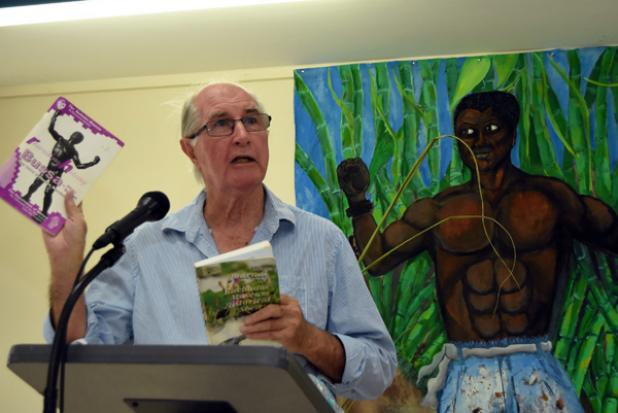
Historian Dr. Karl Watson as he showcased some of the available literature on the 1816 rebellion in Barbados, as he delivered a lecture in commemoration of the bicentenary of that historic event.
RESPECT DUE
Fri, 04/15/2016 - 12:00am
Other martyrs of 1816 revolt must be recognised
NOTED historian, Dr. Karl Watson, has described the omission of the other martyrs of the 1816 rebellion, as a slap in the face of the dead.
His comments came yesterday during a lecture hosted by the Barbados Library Service in commemoration of the bicentenary of the 1816 Uprising in Barbados.
Stressing that it is not his intention to displace now National Hero Bussa from history’s page, he said there is evidence which suggests that he was part of an inner group of leaders, all of whom are not known nor recognised for their leadership role in the revolt.
“I am very conscious of the fact that people may see me as wanting to cry down Bussa, or displace Bussa. That is not what I am doing. But I honestly feel if a number of people paid for their participation with their lives and the documents do indicate that these were very important people in the planning process and the execution process, why should we exclude them when we are giving thanks and praise 200 years later? Why should they not be included? Don’t you see it as a slap in the face to dead people or an injustice?” he asked the audience.
The historian pointed to the various methods used at that time to collect evidence on the revolt including: local reports from the House of Assembly, plantation documents, newspaper accounts, letters of private individuals, maps, flags and banners as well as oral traditions.
He said that to date, Bussa’s place of birth is unknown, so too is his age, but it can be inferred that he had a military role. Assuring that he does not “cherry pick” evidence for his research, he pointed to one letter submitted to the newspaper in 1876 which referred to martial law of General Bussa. He noted that many persons use this ranking to ascribe Bussa as the unchallenged leader.
Dr. Watson says it is believed that Bussa was killed on Bayley’s plantation during the fighting which began on Easter Sunday. However, his body was never located, which for him is another clue that Bussa did not have full leadership status, since leaders at that time were made an example of dead or alive, to send a strong message to other enslaved persons.
The historian suggested that one of his own distant relatives, Joseph Pitt Washington Franklin, son of a plantation owner and a mulatto slave, was integral in this epic fight by encouraging slaves to revolt. Other names such as “Jacky” and “Johnny” were also highlighted for their role that Easter weekend 200 years ago. He said Joseph Pitt Washington Franklin was captured and identified as a principal leader and was tried and executed at Enmore House on July 2, 1816.
It is against this background that Watson is making a call for a monument to be erected to memorialise Joseph Pitt Washington Franklin at the roundabout at Enmore, which he believes would be a fitting compliment, not competition, to the Emancipation Bussa statue.
During his lecture Dr. Watson also highlighted the flag that was carried into battle by the enslaved on a cotton sheet, with the word “endeavour” used several times. He noted that the word endeavour was also placed on four additional banners now housed in New York. To this end he suggested that the action taken by the ex-slaves should be referred to as the “Endeavour Revolt”. (JH)
